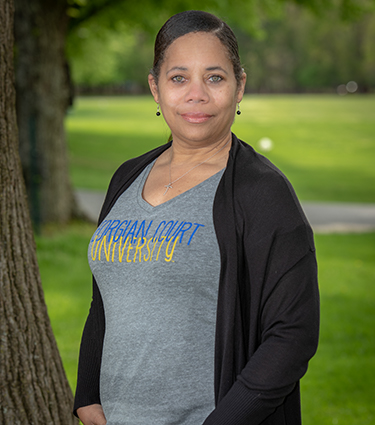Elizabeth “Lynn” Osborne ’18, ’19
From Devastation to Entrepreneurship: A Holistic Journey
 On September 29, 2005, Elizabeth “Lynn” Osborne woke up deaf in one ear. Eighteen months later, it happened again with her other ear.
On September 29, 2005, Elizabeth “Lynn” Osborne woke up deaf in one ear. Eighteen months later, it happened again with her other ear.
Doctors diagnosed her with Ménière’s disease, then later with fibromyalgia and Sjogren’s syndrome. Lynn was working as an assisted living administrator, nurse, and Realtor at the time of the first episode, and then trying to hold on to her career as a Realtor during the second. She decided to return to school to pursue her psychology degree at Georgian Court and work in a role where she could help people cope with loss. Shortly thereafter, she was rear-ended by a tractor trailer and needed back surgery.
Throughout the devastating events, Lynn adopted a new mantra: “It’s life-altering, not life-threatening.” She began addressing the challenges in her life one at a time. She had withdrawn from Georgian Court in 2009 to work on her health and hearing loss. She tried hearing aids, but they didn’t work. She got her first cochlear implant hearing device in October 2009 and the second in January 2016. “I had to learn how to hear again,” she says. She began pursuing a holistic lifestyle and building her strength after the crash.
In 2017, the Jackson resident returned to Georgian Court, determined to see through her goal. Lynn completed her bachelor’s degree in psychology in 2018 and is graduating in 2019 with her Master of Arts in Integrative Health. In 2016, she and her daughter, who also has autoimmune disorders, co-founded Divine Divas, a Integrative Health consultancy. The two host workshops and events to promote healthy living and self-care. She says that the confidence she regained through her academic journey, the development of Divine Divas, and the wonders of technology, she was able to return to being an assisted living administrator.
Lynn and her daughter hope that their business’s multifaceted approach will help people, especially women, take better care of themselves. “When somebody comes in to meet with you, you don’t know what’s going to work for them. Not everybody wants to talk. Not everybody needs a counselor,” she says. “Some counselors are better able to draw things out of you than others, but if you can let somebody just journal or free-write or do art or whatever, it’s letting them choose what works for them—whatever works, works.”
Story contributed by Gwen Moran.
